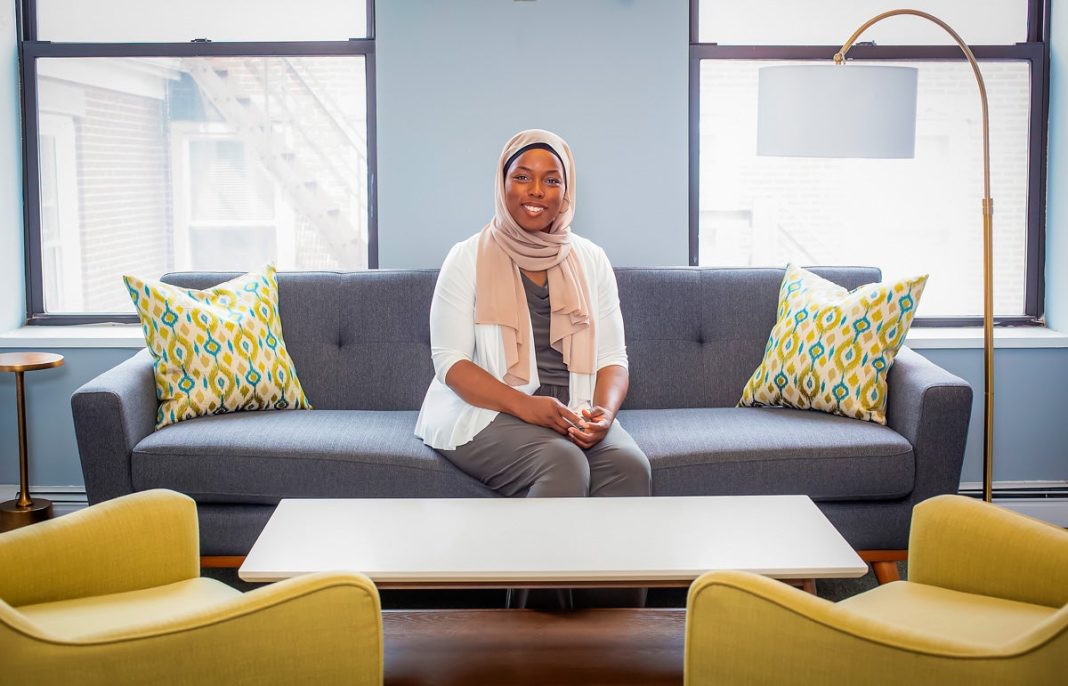Adilah Muhammad of Lewiston is president and founder of the Third Place, the first coworking space for BIPOC Mainers, and has been a voice of leadership in housing equity and BIPOC advocate for over a decade.
She owns a strategic planning and research consulting firm called Scorecard that specializes in inter-organizational collaboration in nonprofits and co-owns a real estate investment company with her husband. Currently the program committee chair for the Maine Community Foundation, she has taken on leadership roles in many nonprofits, including Raise-Op Housing Cooperative, downtown neighborhood organizations in Lewiston, L/A Arts and the Maine Women’s Fund.
We recently caught up with the mother of four to learn more right after a camping trip, a favorite activity of hers.
Mainebiz: What was your motivation in founding the Third Place and what does it provide to the BIPOC community not found elsewhere?
Adilah Muhammad: Connecting Community Assets. There are a number of organizations that provide direct service to communities of color. However, there were none that focused on cultivating and connecting the growing community of professionals, entrepreneurs, and community builders who have chosen Maine as their home. No one was really understanding that BIPOC folks were not experiencing the same quality of life as their white counterparts. BIPOC folks have limited social, cultural and professional infrastructure that is essential to building and sustaining life outside of the workplace. Companies can do all they can to recruit a diverse workforce, but if workers don’t have opportunities to play and connect to community outside of the workplace, there is little chance at retaining them for the long haul.
MB: What got you interested in real estate investment?
AM: Everyone needs housing and it’s a stable investment. Both my husband and I are self-employed, so it started out as a way to create our own retirement income. However, when we were approached by more and more people looking for safe, affordable housing options we realized that we could continue to invest for ourselves while also being in service to the community.
MB: Can you tell me a little more about your passion for and involvement in the intersections of the arts and racial justice and equity?
AM: The arts amplify all. I’m intrigued by the ways the arts draw people in who would not otherwise pay attention. It’s a strong organizing tool that appeals to individuals as sensory beings. One of the things I enjoyed most was organizing youth open mic shows at the LA Arts Downstage. These shows primarily showcased Black youth and artists. Through their art, you could identify where racial injustice showed up and see how their ability to openly express themselves created justice in the body.
MB: What initially drew you to your advocacy work?
AM: My own experience. I have wanted to pick up and leave Maine on several occasions due to a lack of social and cultural opportunities I was looking for. However, I am also a natural problem-solver that just couldn’t allow myself to do so. I heard enough anecdotes and saw enough friends leave the state to know at least some of what needed to get done to slow the tide.
MB: How did your strategic planning and research consulting firm, Scorecard, come to be?
AM: Being a landlord opened my eyes to so many issues in the community that reached beyond housing. As a landlord, you are privy to the intimate details of a lot of people’s lives and you begin to see patterns in households and identify the systems that both sustain and attempt to disrupt those patterns. I went back to school to make sense of what I was seeing [and received a master’s in public policy and management from the University of Southern Maine’s Muskie School of Public Service]. The more I uncovered, the more I wanted to fix. Consulting was a way for me to work with organizations to improve the systems that could create more positive impacts.
MB: You grew up in Georgia and received a degree in French and economics from DePauw University in Indiana. What brought you to Maine?
AM: My imagination. Growing up I absolutely hated the summer heat. One day I was watching “Lifestyles of the Rich and Famous” and heard Robin Leach mention a place called Maine with mild summers. From then on, I was set on getting there. As a kid, I started to imagine living in Maine and even had an imaginary cottage behind our garden. I ultimately fell in love with a Mainer.
